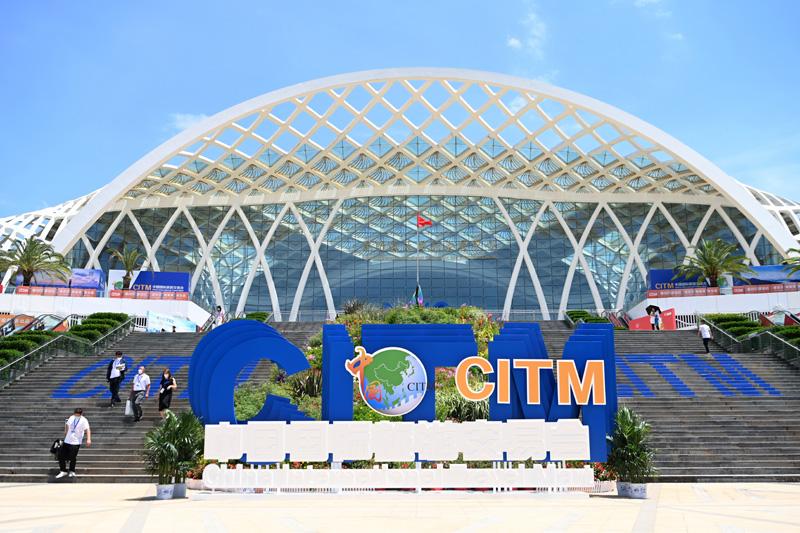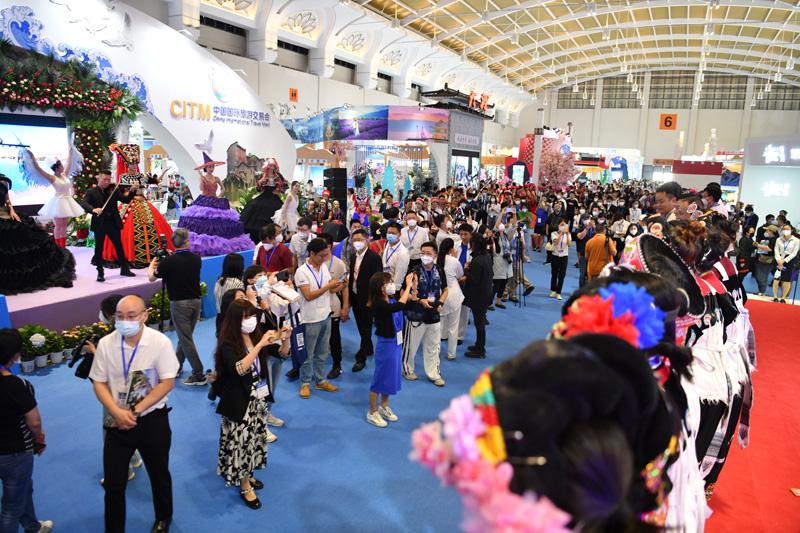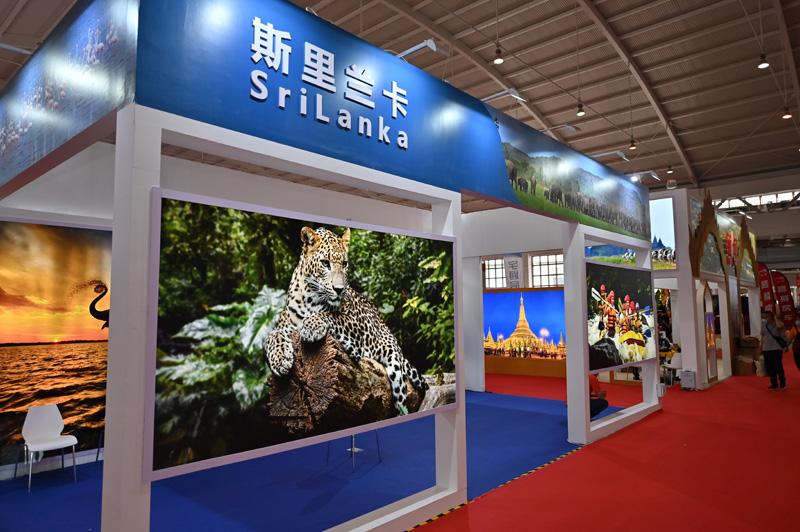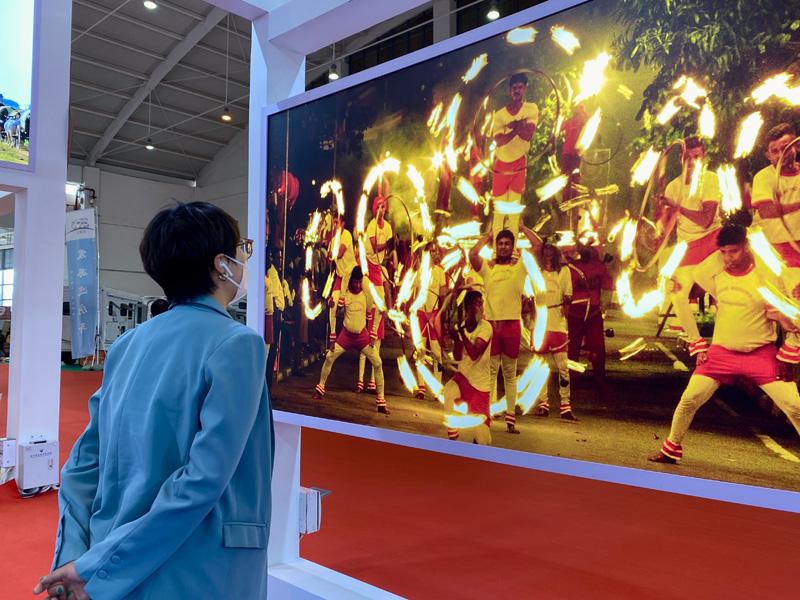Reply To:
Name - Reply Comment

The 2022 China International Travel Mart (CITM) will be held from July 22 to 24 in Kunming. Exhibitors from 71 countries and regions, including Korea, Thailand, Malaysia, Bangladesh, Cambodia, etc. are attending the event online or offline, to negotiate and seek cooperation.
Launched in 1998, China International Travel Mart is an international platform to showcase the achievements of Chinese culture and tourism development and to enhance exchanges and cooperation with other countries around the world. This year is the 11th time that CITM is held in Yunnan.
Exhibitors from 71 countries and regions attend CITM to seek cooperation
CITM exhibition area is about 80,000 square meters, with 8 exhibition halls and about 4,200 standard booths. Exhibitors from 71 countries and regions, 31 provinces in China, as well as 261 independent groups are attending CITM.
7 major exhibition areas, including the destination exhibition area, cultural tourism enterprise exhibition area, cultural expo exhibition area, smart tourism exhibition area, international exhibition area, new forms of tourism exhibition area and Yunnan exhibition area, are set up at the fair spot. In addition, the “East Asian Cultural Capital” exhibition area and the “Lancang-Mekong Tourism City Cooperation Alliance” exhibition area are added.
The Kunming Dianchi International Convention and Exhibition Center, where the CITM is held, is rather bustling. Before the exhibition area of prefectures and cities in Yunnan, ethnic people are merrily performing folk songs and dances; in the Malaysian exhibition area, the Musang King durian, coffee, satay kebab and pandan cake steamed with glutinous rice are attracting numerous exhibitors and visitors; in the Yunnan exhibition area, thousands of photos taken during the migration and return of Asian elephants are so eye-catching that many people linger on here.
Smart tourism digital technology gives rise to new forms of tourism
Smart tourism is the focus of the CITM. At the Smart Tourism Innovation and Development Forum, experts from countries such as China, Tanzania, Israel and Switzerland had a heated discussion on smart tourism, and believed that digital technology is giving birth to new forms of tourism and stimulating tourism industry innovation efficiencies.
Wang Hao, a member of the party group of the Yunnan Provincial People's Government, said that promoting smart, high-end and customized tourism is not only a practical need for the high-quality development of the tourism industry, but also an inevitable requirement for the upgrading of cultural tourism consumption. He introduced the development of a smart tourism platform – “Travel Yunnan with a Mobile Phone”, saying that “Yunnan will speed up the application of new technologies such as virtual reality, augmented reality metaverse and robot tour guides to improve the smart tourism industry”.
Mbelwa Kairuki, Ambassador of Tanzania to China, said that Tanzania is implementing smart tourism innovations, including a Tanzania digital booking platform to be established in China in the near future, cooperation with Chinese technology companies in QR code payment, and cooperation with different digital media platforms to promote Tanzania tourism to Chinese tourists.
Dacheng Tao, a fellow of the Australian Academy of Science and European Academy of Science, pointed out that the industrial metaverse integrates digital content experience with physical objects, and bring new possibilities to tourism. It can break through the digital islands of tourists, scenic spots, and scenic spots, innovate digital collections as the engine of digital cultural tourism, and finally realize the smart service, management and operation of cultural tourism products.
“New focuses” for culture and tourism development along the China-Laos Railway
The “Forum on China-Laos Railway Helps to Build a Community of Shared Future in Asia” was held on the opening day of CITM. A number of experts, scholars and representatives of related tourism and transportation enterprises attended the Forum, to discuss the future potential of markets along the China-Laos Railway, and explore a new pattern of integrated development of international culture and tourism in the Lancang-Mekong River Basin and other regions.
Daopai Chanthanathin, Deputy Consul General of the Lao Consulate General in Kunming, said that the operation of the China-Laos Railway converts Lao from a landlocked country to a land-linked hub, which brings unprecedented development opportunities and promotes exchanges and cooperation between Laos and China in the sectors such as economy and culture. According to statistics, in just 7 months from its operation, over 4.11 million passengers (540,000 passengers in the Laos section) and 780,000 tons of goods were transported cumulatively.
Liu Yingkui, deputy head of the Academy of China Council for the Promotion of International Trade, said that the operation of the China-Laos Railway effectively promotes the formation of large regional tourism and commodity markets, boosts unimpeded trade, and accelerates the flow of factors and the development of regional service trade. Under this background, efforts should be made to further improve the China-ASEAN railway and tourism cooperation mechanism, promote the integration of industrial and supply chains, and unblock channels by various means, strengthen the construction of Pan-Asian Railway and infrastructure in the west and border areas, and accelerate the formation of a large regional unified market.
During the Forum, the Yunnan Initiative on China-Laos Railway International Tourism Cooperation was issued, to better develop tourism products, build a tourism economic belt, and properly manage and operate the international tourism brands along the China-Laos Railway, and give full play to the unique role of international tourism along the China-Laos Railway in building a community of shared future in Asia.


